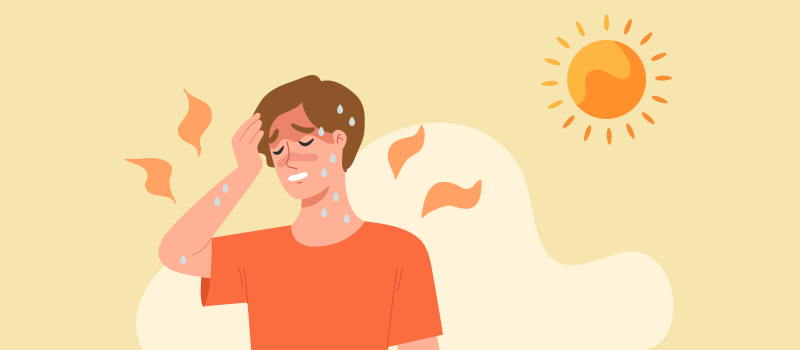What’s the Buzz
The Bee Healthy Blog
How to Treat Sun Poisoning vs Sunburn

Moderate sun exposure can be beneficial to your health. But, as you probably know, too much sun can damage your skin. Both UVA and UVB rays in sunlight can damage the skin in different ways, UVA rays causing premature aging and UVB rays sunburn.
Most people have suffered at least one mild sunburn at some point in their lives, but a more severe type of sunburn called sun poisoning is less common.
In this article, we will talk about the differences between sunburn and sun poisoning and how to treat them.
What is sunburn?
Sunburn consists of red, swollen, itchy, warm, and painful skin that occurs due to too much exposure to UV rays in direct sunlight or artificial sources such as tanning beds and sun lamps. Sunburn symptoms usually appear within a few hours of exposure and can take several days to heal.
Repeated sun exposure that leads to sunburn increases your risk of premature skin aging and developing skin cancer.
The best ways to protect yourself from sunburns are to wear sunscreen; cover up with a wide-brimmed hat, sunglasses, and long-sleeved shirts and pants; and avoid outdoor activities between 10 am and 4 pm.
What is sun poisoning?
Sun poisoning is a severe sunburn that occurs due to an allergic reaction in the skin after exposure to the sun’s rays for an extended period.
It is also called a sun rash because sun poisoning symptoms include hives, blisters, rash, and sunburn symptoms like redness and discomfort. Other symptoms of sun poisoning may include flu-like symptoms, headache, dehydration, dizziness, fever, chills, and nausea.
Depending on the extent of skin damage, sun poisoning can take several weeks to heal.
The best way to prevent sun poisoning is to avoid prolonged sun exposure and wear sunscreen and protective clothing when outdoors.
Note: Sun poisoning is different from polymorphous light eruption which consists of small bumps of inflamed skin that appear in the spring and summer months in people who have developed a sensitivity to sunlight.
What are the risk factors for a severe burn?
Anyone can get sunburned, including people with darker skin. Everyone should therefore take precautions to protect themselves against sunburn and sun poisoning. However, some people are at higher risk of skin burns, such as:
- People with fair skin, blue eyes, and blond/red hair
- People who live in sunny climates or at high altitudes
- People who work outdoors
- People who swim or spend time in water (wet skin burns more easily)
- People who regularly use sun lamps or tanning beds
- People who drink alcohol during outdoor recreational activities
- People taking certain photosensitizing medications. Examples include certain antihistamines, antibiotics, oral contraceptives, and nonsteroidal anti-inflammatory drugs.
How do you treat sunburn or sun poisoning?
Sunburn
Most sunburns can be treated at home. You can treat a regular sunburn by:
- Rehydrating with cool water and other drinks
- Soothing irritated skin with cool compresses and aloe vera gel
- Gently exfoliating the skin when it starts peeling
- Avoiding further sun exposure
- Taking over-the-counter medications for pain relief such as ibuprofen (Advil, Motrin) or naproxen (Aleve)
Sun Poisoning or Sun Rash
Sun poisoning is a significantly worse sunburn and a more serious condition. It requires medical treatment at an urgent care center or hospital to prevent infection. The most severe cases need to be treated promptly because of the increased risk of dehydration when a person is severely sunburned.
Doctors may use one or more of the following treatments for a severe case of sun poisoning:
- Intravenous (IV) fluids to treat dehydration
- Steroid creams for painful blisters (you should avoid popping blisters)
- Oral corticosteroids to treat pain and swelling
- Topical antibiotics to prevent infection
Protecting yourself from excessive sun exposure and UV rays is the best way to prevent severe sunburn
The best way to prevent sunburn and sun poisoning is to minimize sun exposure, cover up exposed body areas, and wear a broad-spectrum SPF 30 or higher sunscreen every day, including cloudy days, for protection against both types of UV rays.
Should it occur, mild sunburn can be treated with home remedies and over-the-counter medications. Sun poisoning or sun rash, on the other hand, is a type of severe sunburn that can lead to serious complications like infection and dehydration if you don’t see a doctor and get medical attention right away.
References:

SOCIAL